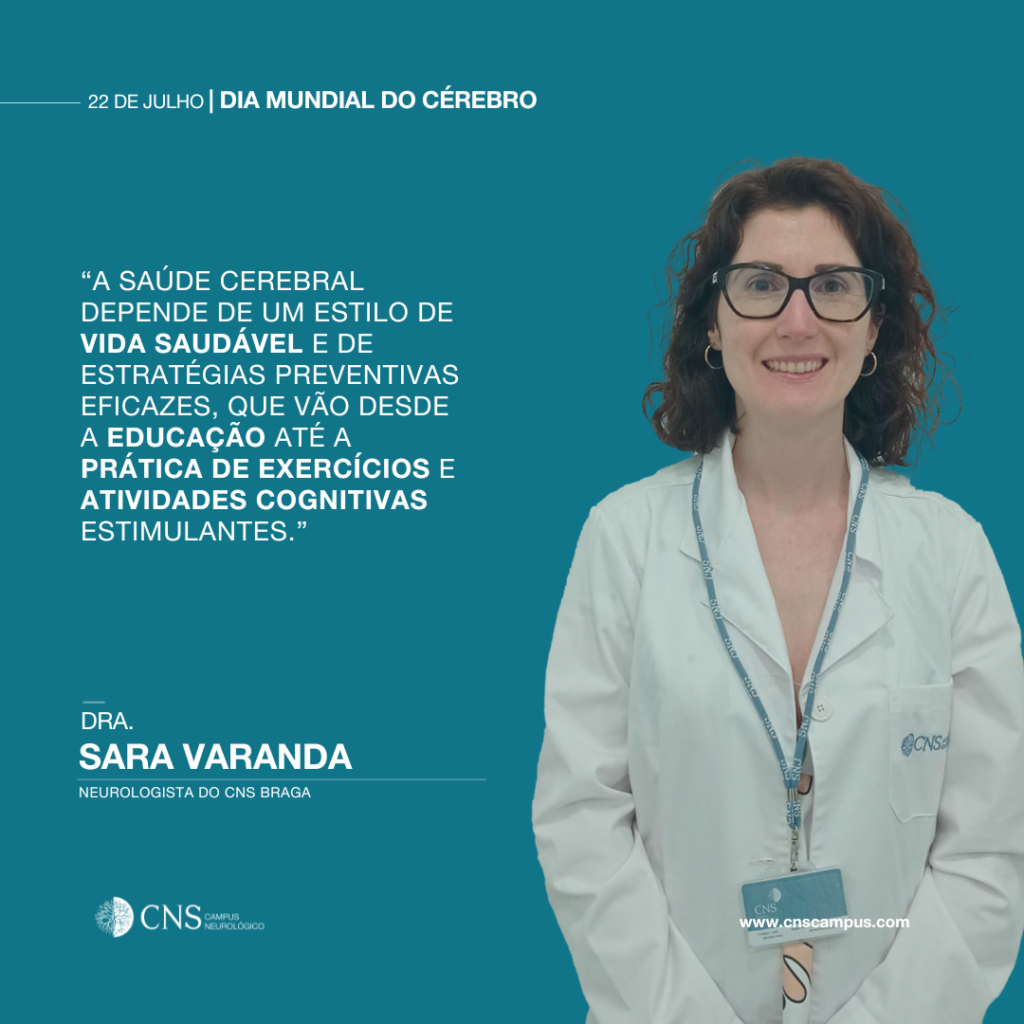Brain health depends on a healthy lifestyle and effective preventive strategies, ranging from education to exercise and cognitively stimulating activities. On World Brain Day, Dr. Sara Varanda, a neurologist at CNS Braga, calls for greater dedication to brain health.
If the heart is popularly called “the machine”, then we must remember that no “machine” works without “software” or an operating system that activates its gears. And this system, in the human body, is the brain. Without a brain there is no soul and the organism, no matter how healthy it is, loses its harmonious functioning and fails.
In a modern era in which people have, or should have, routine medical follow-up, investment in promoting brain health is still scarce. People and doctors remember brain health when signs of malfunction appear – headaches, sleep difficulties or forgetfulness, for example. However, when nothing warns about the software, in general, little is done to prevent failure. In the month in which World Brain Day is celebrated, it is therefore worth reflecting on the need for greater dedication to brain health.
Scientific work that has focused on promoting brain health has mainly focused on the disease – how to prevent cognitive decline in Alzheimer’s disease, how to minimize the cognitive impact of multiple sclerosis and migraines, or how to reverse motor symptoms (slowness, stiffness, tremor) in Parkinson’s disease.
With regard to Alzheimer’s disease, it has been found that some brains in which the disease actually exists, that is, in which there is an accumulation of the abnormal protein responsible for the death of neurons (worker cells in the brain), do not show any signs of active disease during life, that is, they belong to asymptomatic people: without forgetfulness, autonomous and active. The concept behind this “masking” of the disease is that of cognitive reserve: the disease exists, the toxic protein accumulates, and neuronal death occurs, but healthy areas ensure adequate brain function for longer. How can this cognitive reserve be promoted? The main factor seems to be education. There is controversy over whether education has a direct effect on cognitive reserve or whether, on the other hand, it plays an indirect role by generally reflecting the socio-family context and general health status. Promoting access to school and equalizing opportunities can ultimately prevent the emergence of symptoms in the context of the disease. Still in the context of dementia prevention, a study that included almost 4,000 healthy people in Europe and followed them for 20 years documented that regular practice of board games prevented cognitive deterioration in patients who were later diagnosed with dementia: they had a slower deterioration and, in addition, fewer depressive symptoms. Preventive strategies such as this fit the definition of “neuroenhancement”. They are inexpensive and have fewer side effects than potential drugs that may be developed in this field.
In the area of Parkinson’s disease, in which an abnormal protein also accumulates in cells, studies on promoting brain health have been carried out on animal models or small patient samples, but they indicate, for example, benefits of moderate-intensity aerobic exercise on motor symptoms. The influence on quality of life does not appear to be very different depending on the type of physical exercise practiced (dancing, swimming, water aerobics or balance exercises). Music, in the form of joining a community orchestra, singing or playing an instrument, has also shown benefits in the disease.
Thus, the brain is sensitive to lifestyle. A good level of education, the best possible work environment, engaging in stimulating hobbies, practicing regular physical exercise and controlling vascular risk factors (blood pressure, cholesterol, sugar, smoking and alcohol consumption) certainly contribute to brain health. When neurological diseases appear, these measures have the potential to reduce symptoms, becoming essential pillars of treatment, at a time when, unfortunately, we still do not have pharmacological preventive measures.
Dr Sara Varanda, neurologist
CNS – Campus Neurológico
